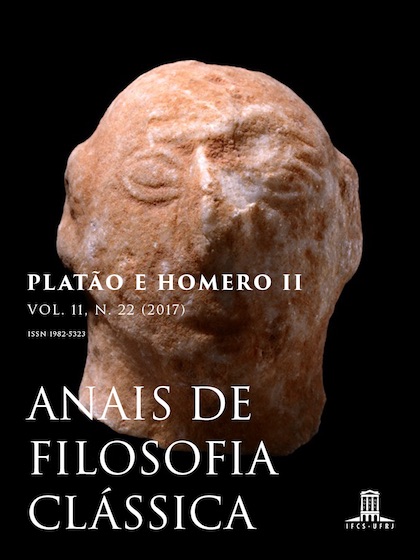A autoridade de Homero e da tradição no Fédon
DOI:
https://doi.org/10.47661/afcl.v11i22.22937Palavras-chave:
Platão, Homero, Fedon, tradição poética, dialéticaResumo
A questão da alma em Platão é inseparável da sua relação com a tradição que a precede, especialmente a tradição homérica. A questão desta relação é vasta e delicada porque a estratégia da personagem Sócrates (e do autor Platão) é ambivalente e seu uso das referências homéricas, muitas vezes irônico ou retórico. Este breve estudo pretende contribuir para um problema filosófico de fundo, para não dizer de pano de fundo, muitas vezes negligenciado: se a filosofia difere da tradição (poética) em particular pela tarefa de dar sentido às suas afirmações, isto é, de fundamentá-los na razão, em que base, segundo Platão, esta ambiciosa empresa se apoia?
Downloads
Referências
BRANDWOOD, L. (1976). A Word Index To Plato. Leeds, W. S. Maney & Son.
BRISSON, L. (1982). Platon, les mots et les choses. Paris, Maspero.
BRISSON, L. (2008) (dir). Platon. Œuvres complètes (divers traducteurs). Paris, Flammarion.
BURNET, J. (1900-1907) (ed). Platon. Platonis opera, 5 tomes. Oxford, Oxford University Press.
BURNET, J. (1916). The Socratic doctrine of the soul. Proceedings of the British Academy 7, pp.235-259.
DIXSAUT, M. (1991). Platon. Phédon (traduction, introduction et notes). Paris, GF-Flammarion.
ERLER, M. (2001). Legitimation und Projektion. Die ‘Weisheit der Alten’ im Platonismus der Spätantike. In: Kuhn, D.; STAHL, H. (eds). Die Gegenwart des Altertums. Heidelberg. Forum, pp.313-326.
HACKFORTH, R. (1955). Plato’s Phaedo. Translated with Introduction and Commentary. Cambridge, Cambridge University Press.
HADOT, P. (1989). Literarische Formen der Philosophie. In: GRÜNDER, K.; RITTER, J. (eds). Historisches Wörterbuch der Philosophie, Bd. 7. Bâle. Schwabe, pp.848-858.
HALLIWELL, F.S. (2000). The Subjection of Muthos to Logos : Plato’s Citations of the Poets. Classical Quarterly 50, nº 1, pp.94-112.
HOBBS, A. (2000). Plato and the Hero: Courage, Manliness and the Impersonal Good. Cambridge, Cambridge University Press.
HUNTER, R. (2012). “Homer and Plato”. In: Hunter, R. (ed.) Plato and the traditions of ancient literature: The silent stream. Cambridge. Cambridge University Press, pp.38-108.
LABARBE, J. (1949). L’Homère de Platon. Liège, Faculté de Philosophie et Lettres.
LORENZ, H. (2009), “Ancient Theories of Soul”, The Stanford Encyclopedia of Philosophy (Summer 2009 edition), Edward N. Zalta (ed.), Available in: URL= <http://plato.stanford.edu/archives/sum2009/entries/ancient-soul/> Accessed on: 10th, April, 2016.
ROBIN, L. (1950). Platon. Œuvres complètes (traduction et notes). Paris, Gallimard.
ROWE, C. J. (1993). Plato. Phaedo. Cambridge, Cambridge University Press.
ROWE, C.J. (1999). Myth, History, and Dialectic in Plato’s Republic and Timaeus-Critias. In: Buxton, R.G.A. (dir.). From Myth to Reason ? Studies in the Development of Greek Thought, Oxford. Oxford University Press, pp.263-278.
CANTO-SPERBER, M. (1993). Platon. Phédon (traduction, introduction et notes). Paris, GF-Flammarion.
SEDLEY, D. & LONG, A. (2010) (eds). Plato. Meno and Phaedo. Cambridge, Cambridge University Press.
TARRANT, H. (2015). The Phaedo in Numenian Allegorical Interpretation. In: Delcomminette, S.; d’Hoine, P.; Gavray, M.-A. (eds). Ancient Readings of the Phaedo. Leiden. Brill, pp.134-153.
YAMAGATA, N. (2012). Use of Homeric references in Plato and Xenophon. Classical Quarterly 62, nº 1, pp.130-144.


